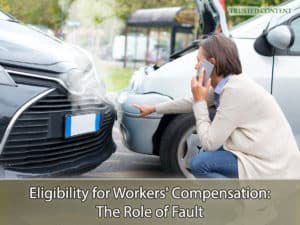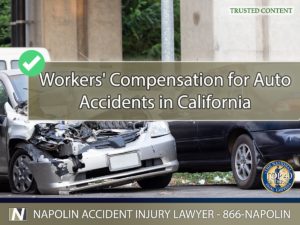Navigating Workers’ Compensation for Auto Accidents in Ontario, California
California's labor laws offer a complex framework, especially when it comes to workers' compensation in the context of auto accidents. This comprehensive guide is designed to help those who have suffered injuries in auto accidents while on duty. It delves into the nuances of California's workers' compensation laws, providing clarity on what constitutes a work-related auto accident and the rights of employees in these situations. Understanding these aspects is crucial for effectively navigating the legal landscape and securing the benefits you deserve.

Defining Work-Related Auto Accidents in California
Defining Work-Related Auto Accidents in California
In California, the definition of a work-related auto accident extends beyond the simplistic view of accidents occurring in company vehicles. It encompasses a range of scenarios where the accident occurs in the course of performing job-related duties. This includes traveling to off-site meetings, transporting goods for work, or even driving between different work locations. The law's broad scope aims to cover various situations that California's diverse workforce might encounter, ensuring comprehensive protection for employees.
Common Scenarios of Work-Related Auto Accidents
Work-related auto accidents in California can occur in various settings. For instance, an employee driving to a client meeting or a construction worker operating a vehicle on a job site are typical examples. These scenarios highlight the diverse nature of work-related travel and the need for clear understanding of what constitutes a work-related auto accident. Each case is unique, and the specifics of the accident and the nature of the job play a crucial role in determining workers' compensation eligibility.
Work-Related Travel and Workers' Compensation
The concept of work-related travel in California is pivotal in understanding workers' compensation claims. Travel that is integral to an employee's job duties, such as driving to client locations or transporting materials between sites, typically falls under work-related activities. However, the line between personal and professional travel can sometimes blur, affecting the eligibility for workers' compensation. It's essential for employees to understand these distinctions to navigate their claims effectively.
Understanding the “Going and Coming” Rule
The “going and coming” rule is a key aspect of California's workers' compensation law. It generally excludes commuting to and from work from being considered work-related. However, there are exceptions, such as when an employee is running errands for their employer during their commute. These nuances are critical in determining the eligibility for workers' compensation benefits and require careful consideration in the event of an auto accident.

Eligibility for Workers' Compensation- The Role of Fault
Eligibility for Workers' Compensation: The Role of Fault
California's workers' compensation system operates on a no-fault basis, which is a significant aspect for employees to understand. This means that eligibility for compensation does not typically depend on who was at fault in the auto accident. Whether the accident was due to a mistake, a momentary lapse in judgment, or even negligence, employees may still be eligible for benefits. This no-fault approach aims to simplify the process and ensure that injured workers receive the support they need.
Exceptions to the No-Fault Rule
While California's workers' compensation system is predominantly no-fault, there are exceptions. For instance, accidents occurring under the influence of alcohol or drugs, or those resulting from intentional harm, may disqualify an employee from receiving benefits. Understanding these exceptions is crucial for employees to navigate their claims and avoid potential pitfalls that could jeopardize their compensation.
Third-Party Liability in Auto Accidents at Work
Third-party liability introduces an additional layer to workers' compensation claims in California. When an auto accident involves a party other than the employer or a co-worker, such as another motorist, the injured employee may have grounds for a personal injury claim against this third party. This can be particularly relevant in cases where the third party's negligence contributed to the accident, offering a route to additional compensation for the injured worker.
Navigating Dual Claims: Workers' Compensation and Personal Injury
Understanding how to navigate dual claims involving workers' compensation and personal injury is vital for employees. In cases where third-party liability is a factor, pursuing both types of claims can provide a more comprehensive coverage for the damages suffered. This approach can address gaps in workers' compensation, such as compensation for pain and suffering, which are not typically covered under workers' compensation benefits.
Exploring Legal Options Beyond Workers' Compensation
When an auto accident is not considered work-related, employees in California still have legal avenues to explore. Personal injury lawsuits can provide an alternative path for compensation, especially in cases where another party's negligence caused the accident. Understanding these options is essential for employees to ensure they are not left without recourse in the aftermath of a non-work-related auto accident.
Personal Injury Lawsuits: An Alternative Avenue
Personal injury lawsuits offer a route to compensation for those involved in auto accidents outside the scope of their employment. These lawsuits can address a range of damages, including medical expenses, lost wages, and pain and suffering. Navigating these lawsuits requires a thorough understanding of California's personal injury laws and often necessitates professional legal assistance.

Navigating Workers' Compensation for Auto Accidents in Ontario, California
Navigating Workers' Compensation for Auto Accidents in Ontario, California
Understanding your rights and the legal framework surrounding workers' compensation for auto accidents in California is crucial. If you're facing challenges in navigating your claim, Napolin Accident Injury Lawyer is here to assist. Our expertise in workers' compensation cases positions us to provide you with the guidance and representation you need. Contact us at (909) 962-8415 for a free consultation, and let us help you secure the legal support necessary to protect your rights and interests in these complex situations.
